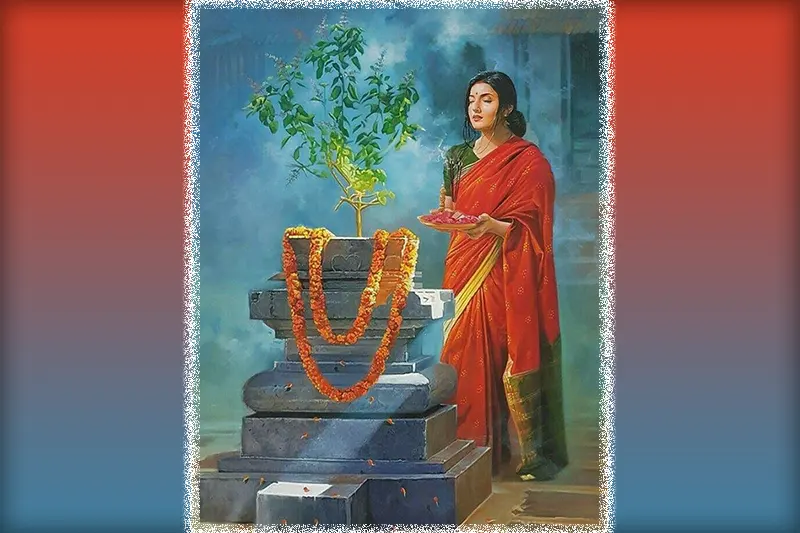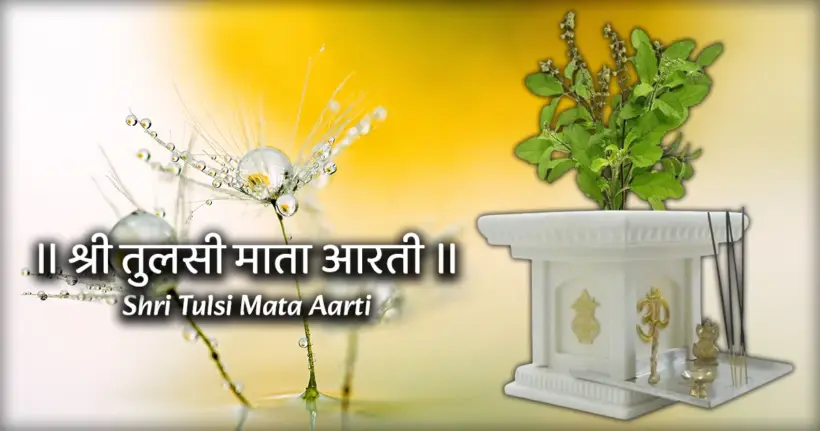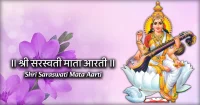Tulsi Mata Ki Aarti (तुलसी जी की आरती), revered as the sacred basil plant, is deeply venerated in Hinduism. Known as “Vishnu Priya” (beloved of Lord Vishnu), she symbolizes purity, prosperity, and spiritual devotion. Tulsi Mata Aarti Lyrics celebrates her divine presence, highlighting her role as a protector, sustainer, and giver of happiness. Singing this Aarti invokes her blessings for health, prosperity, and spiritual growth.
In Hinduism, the Tulsi plant holds a highly revered place. It is customary for followers of Sanatan Dharma to have a Tulsi plant in their homes, which is worshipped every morning and evening. The leaves of the Tulsi plant are considered so sacred that they are offered to deities during worship. Those who regularly worship the Tulsi plant are believed to be blessed not only by Tulsi Mata but also by Lord Vishnu.
Planting a Tulsi in the home and worshipping it daily is said to remove all obstacles in life. According to religious beliefs, a home where Tulsi is worshipped daily and a lamp is lit beneath it in the morning and evening is always graced with happiness and prosperity. Just as an aarti (ritual of worship) is performed for all deities in Hindu rituals, the same should be done for Goddess Tulsi during her worship. It is believed that this practice brings joy and abundance to the household.
॥Tulsi Mata Ki Aarti॥
॥तुलसी जी की आरती॥
जय जय तुलसी माता, सबकी सुखदाता वर माता।
सब योगों के ऊपर, सब रोगों के ऊपर,
रुज से रक्षा करके भव त्राता।
जय जय तुलसी माता।
Jai Jai Tulasi Mata, Sabki Sukhadata Var Mata।
Sab Yogo Ke Upar, Sab Rogo Ke Upar,
Ruj Se Raksha Karke Bhav Trata।
Jai Jai Tulasi Mata।
Hindi Meaning: जय हो, तुलसी माता! आप सबको सुख देने वाली वरदायिनी हैं। आप सभी योगों और रोगों से ऊपर हैं और रोगों से रक्षा करती हैं।
English Meaning: Glory to you, Tulsi Mata! You are the giver of happiness and blessings. You transcend all remedies and diseases, protecting devotees from ailments.

बहु पुत्री है श्यामा, सूर वल्ली है ग्राम्या,
विष्णु प्रिय जो तुमको सेवे, सो नर तर जाता।
जय जय तुलसी माता।
Bahu Putri Hai Shyama, Sur Valli Hai Gramya,
Vishnu Priya Jo Tumko Seve, So Nar Tar Jata।
Jai Jai Tulasi Mata।
Hindi Meaning: आप श्यामा (श्यामवर्णी) और सूर वल्ली (सूर्य के समान तेजस्वी) के रूप में जानी जाती हैं। जो भी भक्त आपकी सेवा करता है, वह मोक्ष प्राप्त करता है।
English Meaning: You are known as Shyama (dark-hued) and Sur Valli (radiant like the sun). Whoever serves you, Vishnu’s beloved, attains liberation.
हरि के शीश विराजत त्रिभुवन से हो वंदित,
पतित जनों की तारिणि, तुम हो विख्याता।
जय जय तुलसी माता।
Hari Ke Shish Virajat Tribhuvan Se Ho Vandit,
Patit Jano Ki Tarini, Tum Ho Vikhyata।
Jai Jai Tulasi Mata।
Hindi Meaning: हरि के शीश पर विराजमान होकर, आप त्रिभुवन में पूजनीय हैं। आप पतित जनों का उद्धार करने वाली महान देवी हैं।
English Meaning: Adorned upon Lord Hari’s head, you are worshipped throughout the three worlds. Renowned as the savior of the fallen, you are truly divine.
लेकर जन्म बिजन में आई दिव्य भवन में,
मानव लोक तुम्हीं से सुख सम्पत्ति पाता।
जय जय तुलसी माता।
Lekar Janma Bijan Me Aai Divya Bhavan Me,
Manav Lok Tumhi Se Sukh Sampatti Pata।
Jai Jai Tulasi Mata।
Hindi Meaning: बिजन (बंजर भूमि) में जन्म लेकर, आपने दिव्य भवनों को शोभायमान किया। मानवलोक को सुख और संपत्ति आपसे ही मिलती है।
English Meaning: Born in barren land, you graced celestial abodes. Humanity derives its prosperity and happiness through you.
हरि को तुम अति प्यारी श्याम वर्ण सुकुमारी,
प्रेम अजब है श्री हरि का तुम से नाता।
जय जय तुलसी माता।
Hari Ko Tum Ati Pyari Shyam Varna Sukumari,
Prem Ajab Hai Shree Hari Ka Tum Se Nata।
Jai Jai Tulasi Mata।
Hindi Meaning: हे श्याम वर्ण सुकुमारी तुलसी! आप हरि को अत्यंत प्रिय हैं। हरि के साथ आपका प्रेम अद्भुत और दिव्य है।
English Meaning: O graceful Tulsi of dark complexion! You are immensely dear to Lord Hari. The divine bond of love between you and Hari is extraordinary.
Conclusion
Shri Tulsi Mata Aarti (श्री तुलसी माता आरती) is an expression of deep gratitude and reverence for Tulsi Mata, who bestows spiritual upliftment, health, and prosperity upon her devotees. By singing this Aarti with devotion, one can invite her divine grace into their lives, fostering a connection with Lord Vishnu and attaining peace and happiness. May Tulsi Mata’s blessings guide us toward purity, devotion, and a fulfilled life.
Interesting FAQs
Q1: Who is Goddess Tulsi?
A: Goddess Tulsi, also known as Vishnupriya (beloved of Lord Vishnu), is revered in Hinduism as a manifestation of purity and devotion. The Tulsi plant (holy basil) is considered her earthly representation and holds immense spiritual significance in Hindu rituals and traditions.
Q2: What is the significance of the Shri Tulsi Mata Aarti?
A: The Shri Tulsi Mata Aarti is a devotional song that praises the virtues and divine qualities of Goddess Tulsi. Chanting this Aarti with devotion is believed to purify the mind and soul, attract positive energies, and strengthen one’s connection with the divine, particularly Lord Vishnu.
Q3: When is the ideal time to recite the Shri Tulsi Mata Aarti?
A: The Aarti is traditionally recited during daily worship, especially in the morning and evening. It is also considered auspicious to chant it during special occasions and festivals dedicated to Goddess Tulsi, such as Tulsi Vivah, which symbolizes her ceremonial marriage to Lord Vishnu.
Q4: Are there any specific rituals associated with chanting the Shri Tulsi Mata Aarti?
A: Devotees often light a lamp or incense near the Tulsi plant, offer flowers, and then recite the Aarti with devotion. Maintaining a clean and serene environment enhances the spiritual experience. Some devotees also observe fasts or perform special rituals to honor Goddess Tulsi, seeking her blessings for well-being and prosperity.
Q5: Can the Shri Tulsi Mata Aarti be chanted in any language?
A: While the original Aarti is in Hindi, translations are available in various languages, including English. Devotees can chant in the language they are most comfortable with, as sincerity and devotion are paramount. Understanding the meaning of the Aarti can deepen the devotional experience.







